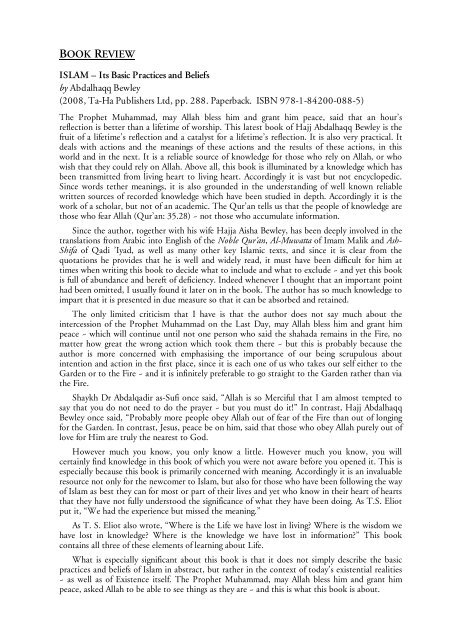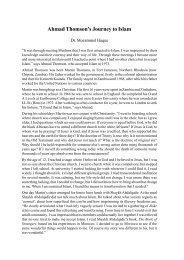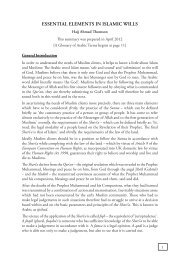Islam ~ Its Basic Practices and Beliefs - Wynne Chambers
Islam ~ Its Basic Practices and Beliefs - Wynne Chambers
Islam ~ Its Basic Practices and Beliefs - Wynne Chambers
You also want an ePaper? Increase the reach of your titles
YUMPU automatically turns print PDFs into web optimized ePapers that Google loves.
BOOK REVIEWISLAM – <strong>Its</strong> <strong>Basic</strong> <strong>Practices</strong> <strong>and</strong> <strong>Beliefs</strong>by Abdalhaqq Bewley(2008, Ta-Ha Publishers Ltd, pp. 288. Paperback. ISBN 978-1-84200-088-5)The Prophet Muhammad, may Allah bless him <strong>and</strong> grant him peace, said that an hour’sreflection is better than a lifetime of worship. This latest book of Hajj Abdalhaqq Bewley is thefruit of a lifetime’s reflection <strong>and</strong> a catalyst for a lifetime’s reflection. It is also very practical. Itdeals with actions <strong>and</strong> the meanings of these actions <strong>and</strong> the results of these actions, in thisworld <strong>and</strong> in the next. It is a reliable source of knowledge for those who rely on Allah, or whowish that they could rely on Allah. Above all, this book is illuminated by a knowledge which hasbeen transmitted from living heart to living heart. Accordingly it is vast but not encyclopedic.Since words tether meanings, it is also grounded in the underst<strong>and</strong>ing of well known reliablewritten sources of recorded knowledge which have been studied in depth. Accordingly it is thework of a scholar, but not of an academic. The Qur’an tells us that the people of knowledge arethose who fear Allah (Qur’an: 35.28) ~ not those who accumulate information.Since the author, together with his wife Hajja Aisha Bewley, has been deeply involved in thetranslations from Arabic into English of the Noble Qur’an, Al-Muwatta of Imam Malik <strong>and</strong> Ash-Shifa of Qadi ’Iyad, as well as many other key <strong>Islam</strong>ic texts, <strong>and</strong> since it is clear from thequotations he provides that he is well <strong>and</strong> widely read, it must have been difficult for him attimes when writing this book to decide what to include <strong>and</strong> what to exclude ~ <strong>and</strong> yet this bookis full of abundance <strong>and</strong> bereft of deficiency. Indeed whenever I thought that an important pointhad been omitted, I usually found it later on in the book. The author has so much knowledge toimpart that it is presented in due measure so that it can be absorbed <strong>and</strong> retained.The only limited criticism that I have is that the author does not say much about theintercession of the Prophet Muhammad on the Last Day, may Allah bless him <strong>and</strong> grant himpeace ~ which will continue until not one person who said the shahada remains in the Fire, nomatter how great the wrong action which took them there ~ but this is probably because theauthor is more concerned with emphasising the importance of our being scrupulous aboutintention <strong>and</strong> action in the first place, since it is each one of us who takes our self either to theGarden or to the Fire ~ <strong>and</strong> it is infinitely preferable to go straight to the Garden rather than viathe Fire.Shaykh Dr Abdalqadir as-Sufi once said, “Allah is so Merciful that I am almost tempted tosay that you do not need to do the prayer ~ but you must do it!” In contrast, Hajj AbdalhaqqBewley once said, “Probably more people obey Allah out of fear of the Fire than out of longingfor the Garden. In contrast, Jesus, peace be on him, said that those who obey Allah purely out oflove for Him are truly the nearest to God.However much you know, you only know a little. However much you know, you willcertainly find knowledge in this book of which you were not aware before you opened it. This isespecially because this book is primarily concerned with meaning. Accordingly it is an invaluableresource not only for the newcomer to <strong>Islam</strong>, but also for those who have been following the wayof <strong>Islam</strong> as best they can for most or part of their lives <strong>and</strong> yet who know in their heart of heartsthat they have not fully understood the significance of what they have been doing. As T.S. Eliotput it, “We had the experience but missed the meaning.”As T. S. Eliot also wrote, “Where is the Life we have lost in living? Where is the wisdom wehave lost in knowledge? Where is the knowledge we have lost in information?” This bookcontains all three of these elements of learning about Life.What is especially significant about this book is that it does not simply describe the basicpractices <strong>and</strong> beliefs of <strong>Islam</strong> in abstract, but rather in the context of today’s existential realities~ as well as of Existence itself. The Prophet Muhammad, may Allah bless him <strong>and</strong> grant himpeace, asked Allah to be able to see things as they are ~ <strong>and</strong> this is what this book is about.
In so doing, it articulates <strong>and</strong> evaluates the main modern thought constructs, philosophicalconcepts <strong>and</strong> ideological dogmas which many people on the face of the planet blindly accept asscientific gospel truth without ever having really reflected on or been capable of assessing them.In this aspect of the book there are echoes of the author’s earlier works, especially The NaturalForm of Man, The Key to the Future <strong>and</strong> Zakat – Raising a Fallen Pillar. He reminds us that ourgreatest enemy is an ignorant self, but that it can be transformed by the grace of Allah to becomea self at peace, pleased <strong>and</strong> well pleasing. <strong>Islam</strong> is the science of waking up.In setting out the basic practices <strong>and</strong> beliefs of <strong>Islam</strong> by reference to both outward action <strong>and</strong>inward meaning, the author affirms clearly <strong>and</strong> eloquently the purpose of <strong>Islam</strong> <strong>and</strong> the reasonfor our existence ~ which is worship of the Divine Source of existence. He does this in such away that the reader must inevitably arrive at a deeper underst<strong>and</strong>ing of both the Creator <strong>and</strong> thecreation in both the Seen <strong>and</strong> Unseen worlds. As Shaykh Moulay Al-Arabi ad-Darqawi oncewrote, Allah is only truly worshipped by means of knowledge: the deeper your knowledge, themore profound <strong>and</strong> illuminated your worship.By holding firmly to this basic truth, the author avoids making the mistakes into which somereligious groups (not only amongst the Muslims but more notably amongst their predecessors)inevitably fall: he does not tend towards worship of the Message ~ even though he has the greatrespect which is its due; nor does he tend towards worship of the Messenger ~ even though he isdearly beloved; the author simply reminds us that we have been created to worship the OneWho sent the Messenger with the Message in order to guide us on the straight path.In dealing with the nature of existence <strong>and</strong> of the One Who created it <strong>and</strong> all that itcontains, the author inevitably deals with those aspects of the human situation with whichpeople often grapple unsatisfactorily <strong>and</strong> with uncertainty, such as the nature of the Decree ofAllah <strong>and</strong> how this contrasts with modern notions of free will <strong>and</strong> the freedom of choice, “whenAllah created both you <strong>and</strong> what you do.” (Qur’an 37.96) As the author himself once observed,“Although I have to make choices, when I look back, I see that I could not have acted anydifferently!”Perhaps one of the most reassuring aspects of the book is that while showing anunderst<strong>and</strong>ing of such deviations as the khawarij/mutazili dialectic ~ which in its most recentform has manifested as the pseudo-salafi/modernist-reformer dialectic, the text is refreshingly freeof such ‘too rigid/too floppy’ distortions of the original message. Hajj Abdalhaqq Bewley simplytells it how it is ~ <strong>and</strong> in so doing he confirms the role of traditional tasawwuf (sufism), which isto guard <strong>and</strong> establish the shari’a of <strong>Islam</strong> in order to arrive, by following the tariqa ofMuhammad, may Allah bless him <strong>and</strong> grant him peace, at knowledge of the haqiqa, in both thisworld <strong>and</strong> the next.Hajj Abdalhaqq Bewley reminds us of the words of Imam Malik ibn Anas, may Allah bepleased with him: “Whoever has the shari’a without the haqiqa is astray. Whoever claimsknowledge of the haqiqa without following the shari’a is a heretic. Whoever has both shari’a <strong>and</strong>haqiqa has realised.” He reminds us of the words of Imam Shafi’, may Allah be pleased with him:“Even if a man comes to you flying through the air, if he does not do the prayer ~ leave him!”He reminds us of the words of Shaykh ibn Ajiba who states in his commentary on the poemof Ibn al-Banna of Saragossa, “The basis of sufism is in five things: Fear of Allah in secret <strong>and</strong> inthe open. To follow the Sunnah in speech <strong>and</strong> deed. To turn away from creation whether it iscoming towards you or leaving you. To be pleased with either a little or a lot. To return to Allahin ease <strong>and</strong> difficulty.”If you read this book ~ <strong>and</strong> I recommend that you do ~ you will most probably react, to cointhe author’s phrase, either like a moth or like a cockroach: you will either be attracted orrepelled by its light ~ for real knowledge is light <strong>and</strong> this book is full of knowledge of the Real,“the Light of the heavens <strong>and</strong> the earth” (Qur’an 24.35). And if you are enlightened <strong>and</strong> inspiredby this book, then it will act as a key to approaching the more detailed texts <strong>and</strong> seminal worksto which the author refers.22
Indeed if you do not already have a teacher, you may well start looking for one, for just as theCompanions learnt from the Prophet, so the Followers learnt from the Companions ~ may theblessings <strong>and</strong> peace of Allah be for ever on him <strong>and</strong> on his family <strong>and</strong> on his companions <strong>and</strong> onhis followers ~ <strong>and</strong> this is how every generation of Muslims has learnt from their predecessors, upuntil the present day. If it were not for the means, the end would escape us.As Shaykh Dr Abdalqadir as-Sufi once said, “I can give you the key <strong>and</strong> show you the door ~but you have to put the key in the lock, <strong>and</strong> turn the key, <strong>and</strong> open the door <strong>and</strong> pass through!”This is what this book will help you do.If you are sufficiently awake to recognise that <strong>Islam</strong> is not what those who reject it or do notunderst<strong>and</strong> it say it is ~ <strong>and</strong> if you would genuinely like to underst<strong>and</strong> what the way of <strong>Islam</strong> is<strong>and</strong> what its fruits <strong>and</strong> rewards are ~ then this book was written for you. If you sometimes feellike a golden fish confined in a transparent bowl, then perhaps this book will help provide youwith the nourishment <strong>and</strong> sustenance that you need to enable you to make your way towards<strong>and</strong> discover the ocean in which in reality you are already swimming. As Shaykh Dr Abdalqadiras-Sufi recently remarked, “At last, a book about <strong>Islam</strong> that you can give to people!”3Hajj Ahmad ThomsonApril 2009/Rabi’al-Akhir 14303




